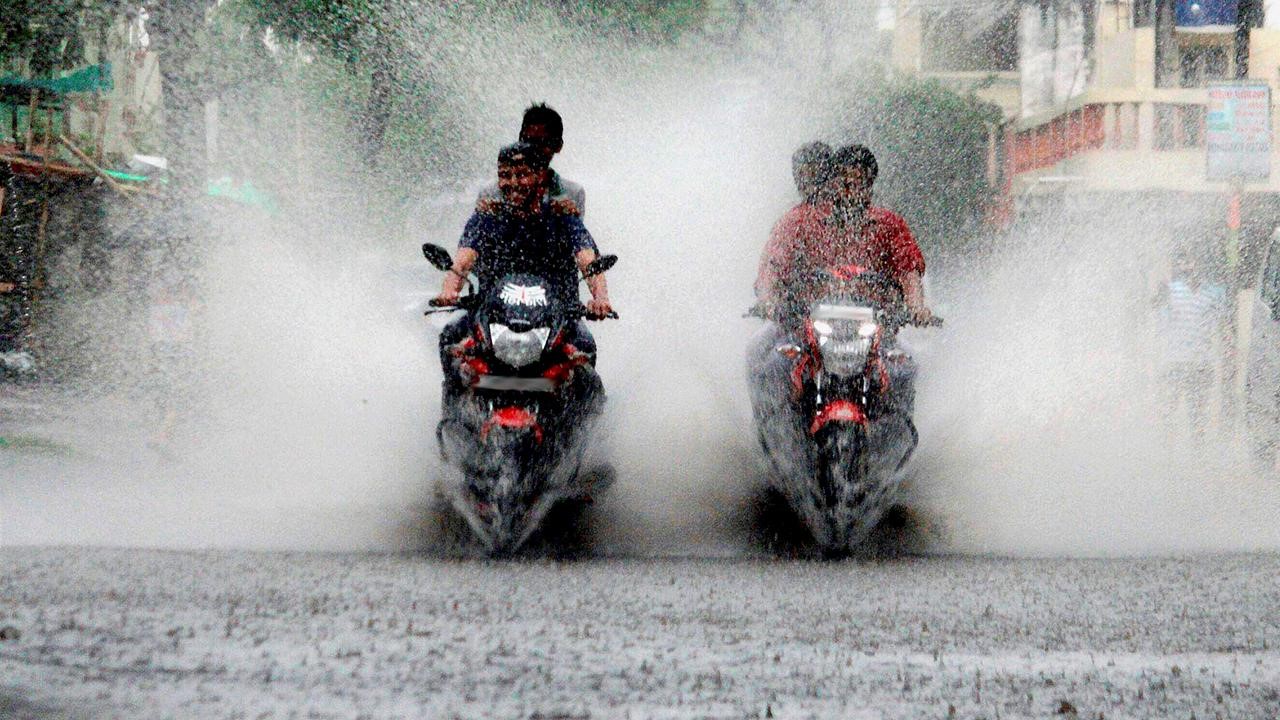General Insurance Blogs, Articles & Updates by - Magma HDI
Have us call you
- RENEW YOUR POLICY
- BUY NEW POLICY

Four insurance covers you must have this monsoon
Monsoon brings us particular delights, after the scorching summer season, rain is the only respite we look forward to. But they are not so delightful when they leave a trail of plight.
Some of the problems revolve around viral or water-borne diseases, floods, property damage, and vehicle corrosion. So, how can you possibly save yourself from such financial setbacks, especially during monsoon? A combination of the right insurance policy can help you from getting attacked by such flailing financial setbacks. Here's a curated list of insurance policies that you can buy to stop burning a hole in your wallet.
Choosing a comprehensive health insurance policy
- Some of the common ailments of this season are malaria, dengue, viral fever, typhoid, chikungunya, diarrhoea, and hepatitis.
- However, insurance companies provide a holistic range of health insurance plans covering almost all of these diseases.
- To meet the rising number of requirements for specific medical treatment claims, insurance companies provide policies specific to diseases at a marginal cost which provides insurance against particular incidence.
- These policies can be specific or add-ons. For instance, dengue can be quite fatal during this time, and companies are offering retail plans for that particular disease.
- However, a comprehensive health insurance policy plan can be lucrative since they cover all the seasonal ailments holistically to alleviate financial distress.
- They also provide pre and post-hospitalization expenses for 60 and 90 days, respectively.
Buying a personal incident policy
Buying a separate personal accident plan for the owners of vehicles can protect you against any uneven eventuality. Potholes and foggy roads can be quite fatal for those who commute on their cars. Personal Accident Insurance will cover injury, permanent disability, and death, for which the entire assured sum is paid.
Subscribing to add-ons for enhanced vehicle protection
- Although third-party motor insurance is a compulsory buy for every vehicle owner, a comprehensive policy can also offer a variety of extra coverages. However, comprehensive motor insurance also has certain limitations; for instance, if rainwater damages your car engine, they are not likely to be covered. But there are exceptions, water if it doesn't get sucked inside would cause further damage - that is not covered in regular comprehensive policy.
- Add-ons like engine and gearbox protector, Zero Depreciation, and Emergency roadside assistance are some of the most popular insurance add-ons during the monsoon season.
- You can choose and compare to buy car insurance online, and to have the best possible fit for you, be sure to go through the exclusion and inclusion document to have an overview of policies you are about to buy.
Buying home insurance
- Torrential downpour or floods can be detrimental to your house, and If you are a resident of a place that is frequently flooded every year, then this insurance would make sense.
- The average premium of insurance such as this ranges between 5000 to 10000 INR, this is meagre and affordable as opposed to losing out your house.
- The insurance would cover any structural damage or content damage in your home. Even if you live in an apartment that is one the higher floors, there are issues like electrical damage and seepage for which you have to pay a hefty amount if not insured.
Verdict
If you are well protected in the month of monsoon, you will find it easier to have a sustainable life during this season. And, for financial and medical protection, insurance policies are the only saving grace.
With the right combination of insurance coverage for you, monsoon can be approached safely by you without feeling inhibited.

Precautions to Take For Your Bike in Monsoon
Monsoon prefaces an ideal fit for a biker’s dream for a planned respite out of the city hustle. Although the season is arguably the best one for bikers, it is also irreversibly lethal primarily due to torrential downpour and fog - that can create scenarios prone to accidents.
Can you get cover from bike insurance?
If you go through the available Bike Insurance Online India , you will find the comprehensive coverage benefits that do provide insurance against damages caused. Although there are variations to the two-wheeler insurance type, comprehensive two-wheeler insurance does cover for damages caused due to natural calamities, accidents, and any human-made crimes. Bike injuries are automatically provided against bodily injuries incurred by you, any third-party (victim), or property damages.
So, if you have a comprehensive bike insurance policy subscribed every year, any costs produced due to any mishaps would rid you of any unprecedented financial distress. Additionally, it also provides legal protection where it covers legal fines alongside a personal accident cover.
In what ways does the monsoon affect your bike?
Two-wheeler performance is likely to fluctuate during monsoon since monsoon has severe effects on most vehicles. The damages caused can be fatal and dangerous unavoidably.
Here are some problems bikers are likely to face in the month of monsoon:
- Engine and brakes suffer a breakdown
- Bike imbalance while encountering potholes causing severe damages
- Bikes skid and tires puncture
- Rain can be corrosive, forming rust and damaging vehicle exteriors like levers and chains, causing the vehicle to stop working
- Rain can be detrimental to headlights, tires, brakes, and also the air filter.
Tips to ensure rider safety during monsoon
- Rain and moisture are corrosive and can cause external damage to your bike. Although two-wheelers have rustproof bodies, the metal frames, however, aren’t. To propel protection against dampness, you can coat the metal frames with anti-rust protection paints.
- If you are parking your bike during monsoon, try looking for covered space. Try and avoid rainwater since the water is collected inside, can cause severe electrical disruptions.
- Travelling while it rains hardly covers your ride, but you can provide maximum protection with rain-proof covers. They can be useful even when you don’t find a shaded parking space.
- Water tends to rust hinges, lever, and chain, which can be detrimental to vehicle movement. You can oil these parts to allow mobility amongst these parts and keep your two-wheeler function. Additionally, coat your battery terminals with grease to stop moisture percolating inside.
- Brakes can get unresponsive due to water damage, making them slippery, jammed, or rusty. If these conditions persist, it can result in undue fatality. Also, try not to hit your brake too hard when riding on a slippery surface since it will cause your bike to skid on the surface, causing some severe damages.
- Keep checking your tires and see if they still can maintain grip while standing on wet surfaces. If you notice tire balding, consider changing them immediately. It is also recommended that you keep the PSI level lower than the prescribed level.
- Moistures keep causing air filter blockages. You can keep cleaning the air-filter periodically to avoid any such discrepancies.
- Lighting is essential, especially when you are riding through a torrential downpour. Be sure to check the lights before heading out. Alternatively, you can also put reflective stickers to help other drivers see you on the road when the light and visibility is low.
- The motor insurance act makes it mandatory to have basic insurance. But try to buy a comprehensive two-wheeler policy that covers protection against third-party liability charges, theft, personal damage, and vehicle damage.
Verdict
As the adage goes, “prevention is better than cure”, the best follow-up for you to do is deploy these precautionary measures to avoid any uncanny instances happening to you and your vehicle.

Top 9 Foods To Be Included In Your Diet For A Safe Monsoon
Monsoon often arrives as a welcome relief to many. The scorching summer heat and humid tiring days are replaced by new hope and joy as the rain comes with new promises of life.
But monsoon also brings with itself a large number of diseases like dengue, malaria, cold and flu. Unhealthy eating habits can make people vulnerable to such ailments. One should also look towards health insurance policy renewal to keep their family safe in case of emergencies.
Health insurance policy renewals are increasing day by day. So immunity is the key to successfully prevent such diseases, which one can only attain following a healthy diet. Some such items are given below.
1. Turmeric:
- It can be used as an antiseptic, antiviral, antifungal and antimicrobial.
- It contains curcumin which helps in providing immunity and taking care of the health
- It is often called the golden spice of the kitchen. One can drink it as Haldi-doodh during bedtime or mixed with food as turmeric powder or freshly grated with other items.
1. Fermented food:
- Probiotics are good bacteria which, when intaken can live in the human intestinal tract and can help in fighting against the harmful germs entering the body.
- Fermented foods like yoghurt, buttermilk, pickled veggies are a must in the diet.
1. Lemons:
- Lemons have Vitamin C, which is very important during this period.
- It helps in building immunity against infections and helps in digesting quickly. It also provides nutrition to the flesh.
1. Masala Tea:
- Cardamom and cloves are essential to guard against infections and fight against diseases like cold and flu.
- Cinnamon has a lot of ethical medicinal values.
- Mixing these along with spices like ginger, black pepper and tulsi leaves with tea can be a natural immunity-booster
1. Garlic:
- It fights against the viruses causing flu and cold and boosts the immune system.
- Having garlic regularly can increase the T cells in the blood, which helps in fighting against such viruses.
- Garlic contains allicin. Raw intake of garlic changes it to allicin, which is a crucial compound helping to boost immunity
1. Dry Fruits:
- Nuts like dates, almonds, walnuts are rich in vitamins and minerals and must be an integral part of the diet.
- They are rich in riboflavin, niacin and Vitamin E, which helps in boosting the immunity.
- Vitamin E is a powerful antioxidant which helps in keeping the body fit and healthy.
1. Spinach:
- Spinach is a good source of Vitamins A, C and E. It also contains beta carotene, folic acid and fibre.
- These nutrients and antioxidants help the body to build up a robust immune system and be fit and healthy.
- They should be washed thoroughly before cooking.
1. Bitter gourd:
- This is not an item that is liked by many but is exceptionally crucial for the diet.
- They are rich in Vitamin C and help in fighting against many harmful viruses.
- One can have them boiled, fried or stewed with other vegetables.
1. Ginger:
- It is a herb having antiseptic, antibiotic and antimicrobial properties. It is also rich in antioxidants.
- It is instrumental in boosting immunity and fighting against diseases like cough and cold, sore throat, and body ache.
- One can have it by mixing it with tea, milk or soups.
Maintaining a healthy food habit can keep one fit and healthy, and then health insurance policy renewal will not be the primary concern.
One should avoid having street foods and carbonated beverages during this period. The drinks lower the minerals’ levels and enzyme activity of the body. Street foods are often left open to many harmful microorganisms. Sea fishes breed during this time. So these should be avoided as much as possible. Besides, one should also look for Health Insurance Policy Renewal to cover the expenses if needed.

Road Safety Tips for Two-wheelers
The majority of road accidents in India are those driving two-wheelers, taking the lives of thousands of people every year. It is a common sight to notice a two-wheeler rider cutting past the traffic, riding on the pavements, or finding a way even in small lanes.
We know that people with two-wheelers love speed and want to reach anywhere faster by avoiding traffic. At the same time, you need to take care of your safety when on the road. Apart from following the below-mentioned tips you can follow to ensure your safety on the road, invest in the best Two-Wheeler Insurance In India . Buying two-wheeler insurance will help you cover the damages in case of any mishap in the future.
Here are some safety tips you must follow:
Tip 1: Wear a helmet
- Invest money in buying a good quality helmet for your protection. It will help in preventing head injuries and will keep you safe in case of an accident.
- Don’t just wear the helmet to prevent yourself from being fined; wear it for your safety. Don’t forget to fasten the straps to keep it in its place.
- Buy helmets with a plastic sheet. This will help you in protecting your eyes while driving.
Tip 2: Control your speed
- The speed of your two-wheeler should not exceed what you can control.
- It is often seen that road accidents occur when the rider couldn’t control the vehicle’s speed on time. Hence, don’t ride too fast to control.
- Maintain a safe distance from other vehicles to avoid accidents. Buy a good two-wheeler insurance policy to protect yourself.
Tip 3: Check your vehicle before riding
- It is a thumb-rule to check your vehicle before you take it on the road.
- Check that the breaks, headlights, indicators, and horn are all in working condition.
- Make it a point to ensure regular servicing of your two-wheeler from an authorized service centre.
Tip 4: Avoid riding in adverse weather conditions
- Try to avoid riding your two-wheeler in lousy weather conditions. Until and unless it is necessary, avoid being on roads in harsh weather conditions.
- An accident’s chances are high in adverse weather conditions like during heavy rains and foggy weather in winters.
- Use anti-reflective stickers on your vehicle or helmet to make yourself visible to other riders.
Tip 5: Look for hazards and obstacles on the road
- Be attentive while riding your two-wheeler.
- Look for garbage piles, pot-holes, speed breakers, oil spills, and stray animals while driving.
- These obstacles or on-road hazards can pose a significant threat to your safety if not paid attention.
Tip 6: Obey Traffic Rules
- Do not try to break the traffic rules. They are designed for your safety and hence should be obeyed.
- Don’t drive when you are under the influence of alcohol.
- Don’t try to over-speed or overtake. Avoid so, especially in case of heavy vehicles.
Tip 7: Invest in two-wheeler insurance
- Investing in two-wheeler insurance is always the right decision.
- In case of any damage or loss during an accident, it will come to your rescue and will secure you against any monetary cost incurred.
- Buy the best two-wheeler insurance in India after comparing different policies and choosing the best for you.
- Also, note that third party two-wheeler insurance is mandatory in India.
By following some simple safety measures, you can avoid accidents and injuries that can be life-threatening. These tips will ensure the safety of you and your loved ones. Buy the best two-wheeler insurance for increased security.


